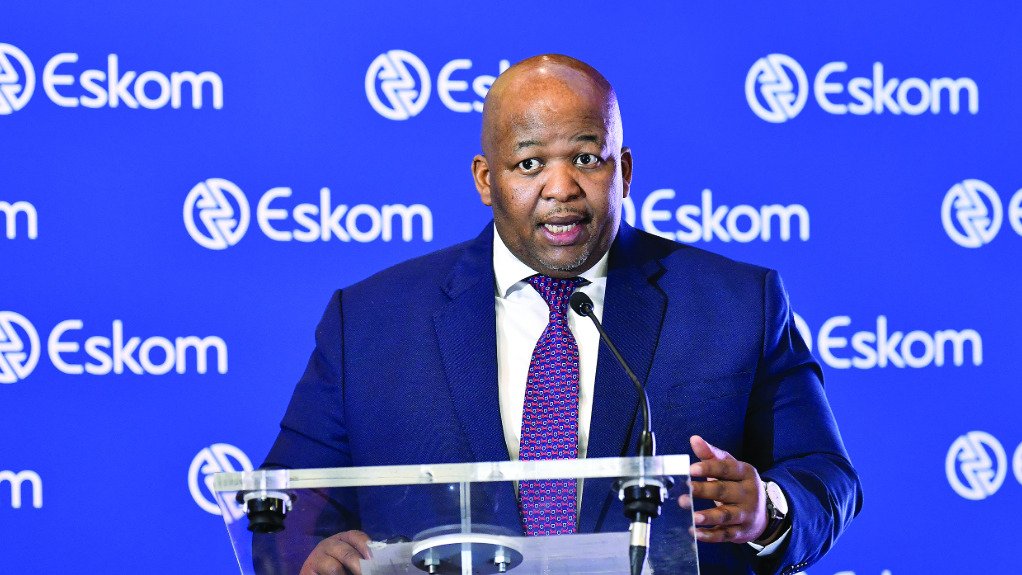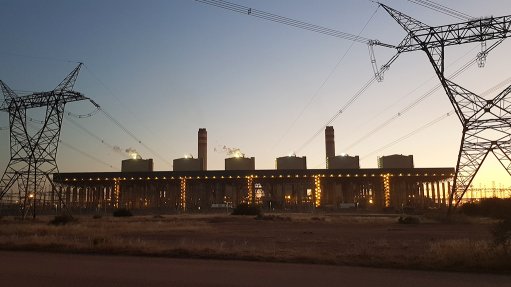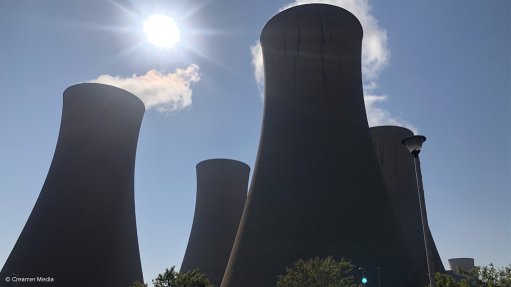Marokane says ‘holistic’ conversation needed on tariff rules and other regulatory gaps
Eskom CEO Dan Marokane says the State-owned company is eager to participate in a “holistic conversation” about the gap that has emerged between the changes under way in the electricity sector and the rules governing the industry, including those related to the way tariffs are set.
In an exclusive interview with Engineering News, Marokane expressed optimism in Eskom’s ability to bring an end to the devastating era of loadshedding, and indicated that the recent period of operational stability had helped to restore morale, slash diesel costs and provide the board and executives with time and space to begin focusing on the future strategy for the unbundled entities.
He acknowledged brewing opposition, however, to its sixth multiyear price determination (MYPD6) revenue application that could translate to a tariff hike of 36% on April 1 next year, if approved in full by the National Energy Regulator of South Africa (Nersa).
The MYPD6 application covers the 2025/26, 2026/27 and 2027/28 financial years and is due to be subjected to a public participation process in the coming months.
The submission has been prepared in line with the MYPD methodology that Nersa sought to overhaul last year, when the Electricity Price Determination Methodology Rules were approved in December.
That decision was rescinded by the Energy Regulator in July, however, when it emerged that the rules could not be implemented, partly owing to timing pressures and partly because they were not accompanied by a methodology to calculate the tariffs.
Marokane acknowledges that the rules, along with many other prevailing regulations governing Eskom and the sector, are “outdated” but says there is currently no clear action plan from Nersa on how these will be modernised to reflect the emerging realities of the industry.
Those changing realities are being addressed primarily through the National Energy Crisis Committee (Necom), but Marokane contends that regulatory changes are not keeping pace with the swift decision-making emerging from that structure, resulting in implementation risks.
“We need to bring the same level of vigour and pace that’s on display at Necom into the regulatory environment, which means Nersa needs to move with pace,” he tells Engineering News.
There might be a need, he adds, to bolster Nersa’s internal capacity in the short term to enable it to address areas of concern, which range from the tariff structure to wheeling and feeding into the grid, to having new rules that cater for traders in areas where Eskom has sole distribution rights.
DEBT-RELIEF ALONE NOT SUFFICIENT
As part of the conditions of the R254-billion debt-relief package, the National Treasury underlined that debt-relief alone would not return the utility to financial sustainability and that tariff increases would also be required.
Eskom estimates that its tariffs are 25% to 30% below cost-reflective levels in real terms, depending on the licensee, be it transmission, generation or distribution, and its submission to Nersa seeks to address the deficit to provide revenue certainty once the debt-relief period ends in 2025/26.
The State-owned enterprise is already facing a backlash to the revenue application, despite it not having been officially released into the public domain. Nersa has indicated that it will publish the application on its website as soon as it has been assessed to be compliant with the prevailing rules, following which public hearings will be scheduled.
Marokane says he understands the concern being expressed by business, civil society, political parties and also the Government of National Unity, which has set reducing the cost of living as a key priority, alongside stimulating growth and job creation.
He also acknowledges ongoing criticism of Eskom’s costs, saying: “I'll be the first to tell you that we need, internally, to continue to sharpen how we change the cost trajectory of this business. We need to look aggressively at our cost profile and be comfortable that we can say to South Africans: ‘we are a prudent operator’”.
However, tariff increases and tariff restructuring to fully reflect the infrastructure costs of electricity supply are still required to ensure that Eskom does not have to, again, seek support from the taxpayer.
COMPREHENSIVE CONVERSATION
Therefore, Marokane believes a “parallel” conversation, probably under the aegis of Necom, is needed on the future revenue model for the electricity supply industry that takes account of the affordability concerns but does not perpetuate the previous vicious cycle that has resulted in bail-outs.
“I want us to have one conversation that is all inclusive, that says what choices we should be making for the country, understanding and having a very clear view of what are the deliverables expected from everyone.”
He believes such an engagement needs to take place without infringing on the independence of the regulator and in a setting that is less combative than is typically the case with public hearings.
Whether such a “comprehensive conversation” can be finalised ahead of Nersa’s public hearings is unclear and Marokane dreads an outcome whereby another interim determination is made that does not provide certainty to Eskom and the National Transmission Company South Africa prior to the expiry of the debt-relief package in 2025/26.
“I fear that that's where we are likely to end up,” he says, acknowledging that the conversation on the revenue model should have been well under way already to ensure resolution in time for the next tariff cycle.
“From the side of Eskom, we are ready to have that conversation. We think it is overdue,” Marokane avers, indicating that if his eight years outside of Eskom have taught him anything it is the need to act with a greater sense of urgency.
In the roles played at both SacOil (now Efora Energy) and Tongaat Hulett before returning to Eskom in early 2024, he relates how acting at speed was the “difference between a business existing tomorrow or not, without the comfort of the State to support you”.
Article Enquiry
Email Article
Save Article
Feedback
To advertise email advertising@creamermedia.co.za or click here
Press Office
Announcements
What's On
Subscribe to improve your user experience...
Option 1 (equivalent of R125 a month):
Receive a weekly copy of Creamer Media's Engineering News & Mining Weekly magazine
(print copy for those in South Africa and e-magazine for those outside of South Africa)
Receive daily email newsletters
Access to full search results
Access archive of magazine back copies
Access to Projects in Progress
Access to ONE Research Report of your choice in PDF format
Option 2 (equivalent of R375 a month):
All benefits from Option 1
PLUS
Access to Creamer Media's Research Channel Africa for ALL Research Reports, in PDF format, on various industrial and mining sectors
including Electricity; Water; Energy Transition; Hydrogen; Roads, Rail and Ports; Coal; Gold; Platinum; Battery Metals; etc.
Already a subscriber?
Forgotten your password?
Receive weekly copy of Creamer Media's Engineering News & Mining Weekly magazine (print copy for those in South Africa and e-magazine for those outside of South Africa)
➕
Recieve daily email newsletters
➕
Access to full search results
➕
Access archive of magazine back copies
➕
Access to Projects in Progress
➕
Access to ONE Research Report of your choice in PDF format
RESEARCH CHANNEL AFRICA
R4500 (equivalent of R375 a month)
SUBSCRIBEAll benefits from Option 1
➕
Access to Creamer Media's Research Channel Africa for ALL Research Reports on various industrial and mining sectors, in PDF format, including on:
Electricity
➕
Water
➕
Energy Transition
➕
Hydrogen
➕
Roads, Rail and Ports
➕
Coal
➕
Gold
➕
Platinum
➕
Battery Metals
➕
etc.
Receive all benefits from Option 1 or Option 2 delivered to numerous people at your company
➕
Multiple User names and Passwords for simultaneous log-ins
➕
Intranet integration access to all in your organisation





















